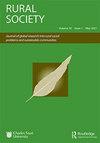Exploring the value of a university-driven mental health self-management programme
IF 1.1
Q3 SOCIOLOGY
引用次数: 1
Abstract
ABSTRACT This article presents findings from analysing a novel approach to helping regional students transition and adapt to university education by teaching them self-management skills. A programme was implemented for first-year students enrolled in various disciplines at regional university campuses in South Australia from 2013 to 2015. Programme outcomes were evaluated using pre- and post-training questionnaires administered to participants to assess changed mental health perceptions or practices. A paired-sample t-test showed statistically significant improvement following the programme. Students learnt coping strategies and skills to care for their own mental health and planned to apply what they learned for their benefit and in their professional practice.探索由大学推动的心理健康自我管理项目的价值
摘要本文通过分析一种新的方法,通过教授地区学生自我管理技能,帮助他们过渡和适应大学教育,得出了一些结论。2013年至2015年,为南澳大利亚地区大学校园各学科的一年级学生实施了一项方案。使用向参与者发放的培训前和培训后问卷来评估项目结果,以评估心理健康观念或实践的变化。配对样本t检验显示,方案实施后有统计学意义的改善。学生们学习了照顾自己心理健康的应对策略和技能,并计划将所学知识应用于自己的利益和专业实践中。
本文章由计算机程序翻译,如有差异,请以英文原文为准。
求助全文
约1分钟内获得全文
求助全文

 求助内容:
求助内容: 应助结果提醒方式:
应助结果提醒方式:


